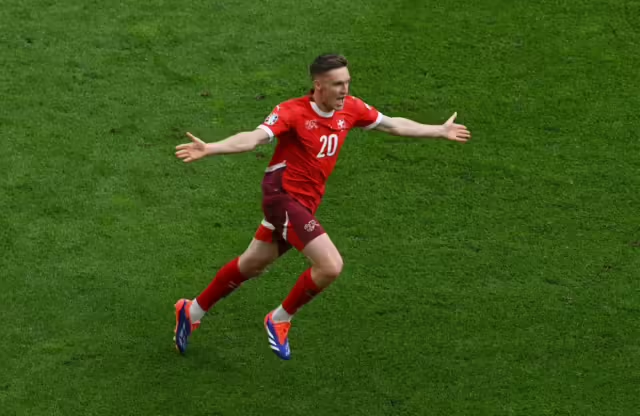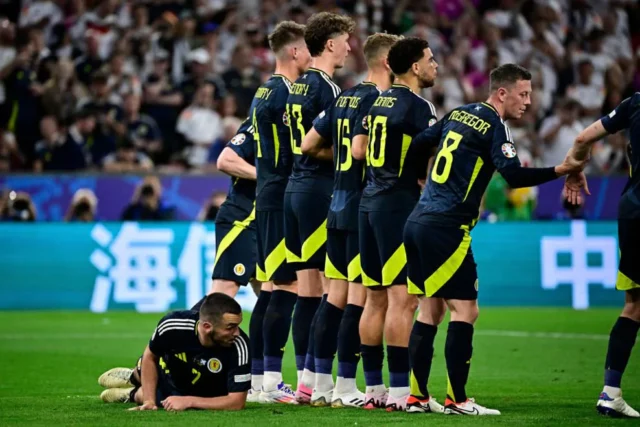Scotland vs Switzerland predictions for this Euro 2024 clash. After a record opening defeat, Scotland aim to restore pride against Switzerland in Euro 2024 Group A on Wednesday in Cologne. Read on for our free betting tips and predictions.


European Championship | Group Stage – Jun 19, 2024 at 8pm UK at Sokoine Stadium

Don’t have a William Hill account? Click below to claim this offer👇
Scotland vs Switzerland Predictions
Key Stats
– Scotland have only won one of their last ten matches.
– Switzerland have scored three goals in their Euro 2024 debut.
– Dan Ndoye had three shots in his last match against Hungary.
Can Scotland Halt Switzerland’s Momentum in Cologne?
In the wake of a devastating 5-1 defeat against Germany, Scotland’s hopes in the Euro 2024 are teetering. The Scots, managed by Steve Clarke, aim to regain their pride and potentially salvage their tournament as they face Switzerland in Cologne. On the other hand, Switzerland comes into this match buoyed by a solid 3-1 victory over Hungary, positioning themselves well in Group A.
Scotland entered the tournament with high spirits, but their euphoria was quickly dampened by a dominant German side. The match saw goals from Florian Wirtz, Jamal Musiala, Kai Havertz, Niclas Fullkrug, and Emre Can, with an own goal by Antonio Rudiger being Scotland’s sole highlight. A red card for Ryan Porteous further compounded their woes, leaving them vulnerable and outmatched.
Switzerland, conversely, demonstrated their attacking prowess against Hungary. Goals from Kwadwo Duah and Michel Aebischer set the tone, and Breel Embolo’s late strike sealed their win. Embolo’s return to the national side after injury was a significant boost, showcasing Switzerland’s depth and resilience.
Expected Lineups
Scotland: Gunn; Hendry, Hanley, Tierney; Ralston, Gilmour, McTominay, Robertson; McGinn, Christie; Shankland
Switzerland: Sommer; Schar, Akanji, Rodriguez; Widmer, Xhaka, Freuler, Aebischer; Vargas, Ndoye; Duah
Scotland will miss the suspended Ryan Porteous, likely replacing him with either Grant Hanley or Scott McKenna. Clarke is expected to make further changes, potentially bringing Billy Gilmour into the starting eleven and possibly replacing Che Adams with Lawrence Shankland.
For Switzerland, Denis Zakaria’s return to training is a positive sign, although he might not start. The team is likely to retain the same lineup that secured their win over Hungary, maintaining stability and momentum.
Tactical Analysis and Key Duels
The game is likely to be decided in midfield, where Switzerland’s Granit Xhaka and Remo Freuler will battle Scotland’s Scott McTominay and Billy Gilmour. Xhaka’s ability to control the tempo and Freuler’s work rate are pivotal for the Swiss, while McTominay’s physical presence and Gilmour’s creativity will be crucial for Scotland.
On the wings, Scotland’s Andy Robertson and Nathan Patterson must contend with the dynamic Swiss wing-backs Widmer and Rodriguez. This duel could be crucial in determining who controls the flanks and subsequently, the flow of the game.
In attack, Scotland’s hopes rest on the creativity of John McGinn and Ryan Christie, but they face a formidable Swiss defence marshalled by Manuel Akanji and Fabian Schar. For Switzerland, the pace and movement of Duah and Ndoye will test the Scottish backline, particularly given their vulnerabilities exposed by Germany.
Gameplay and Strategy
Scotland are expected to adopt a more defensive posture, focusing on maintaining shape and looking to hit on the counter. This approach is necessitated by their need to avoid another heavy defeat and potentially keep their qualification hopes alive.
Switzerland, in contrast, will likely play on the front foot, pressing high and using their wing-backs to stretch the play. Their aim will be to dominate possession, create overloads on the flanks, and utilise the technical abilities of Xhaka and Freuler to unlock the Scottish defence.
Expected Goals Analysis
Switzerland’s performance against Hungary saw them generate numerous scoring opportunities, with a high expected goals (xG) metric reflecting their attacking efficiency. Scotland, on the other hand, struggled significantly against Germany, with a low xG indicating their lack of chances.
Switzerland’s ability to convert their chances efficiently, coupled with Scotland’s defensive frailties, suggests that the Swiss are likely to have the upper hand in this encounter. Scotland’s main threat might come from set pieces, given their aerial strength and the delivery from players like Robertson.
Tactical Analysis: Deep-Dive
Offensive and Defensive Strategies
In their opening match against Germany, Scotland’s defensive strategy was significantly tested and ultimately found lacking. Steve Clarke set his team up to be compact and resolute, yet they were overwhelmed by Germany’s fluid attacking play. The backline, featuring the likes of Scott McKenna and Kieran Tierney, struggled to contain Germany’s dynamic forwards. The expulsion of Ryan Porteous only compounded their problems, forcing them into a deeper defensive posture which they could not maintain effectively.
Switzerland, on the other hand, displayed a balanced approach in their 3-1 victory over Hungary. Murat Yakin’s men employed a high press to disrupt Hungary’s build-up play, with Granit Xhaka and Remo Freuler orchestrating the midfield. Defensively, Manuel Akanji and Fabian Schar provided solidity, allowing their wing-backs, Silvan Widmer and Ricardo Rodriguez, to support the attack. This dual-role of defensive solidity and attacking support was pivotal in their success, showcasing their ability to transition quickly and effectively.
Individual Performances of Key Players
For Scotland, the standout performer in their otherwise dismal display was Scott McKenna. Despite the heavy defeat, McKenna was crucial in intercepting and clearing numerous German attacks. However, the attacking players like Che Adams and Ryan Christie were largely anonymous, failing to create significant chances or test the German defence.
Switzerland’s victory was marked by strong performances across the board. Kwadwo Duah and Michel Aebischer, both scoring their first international goals, were instrumental in the attacking third. Breel Embolo’s return from injury and his subsequent goal highlighted his importance to the team, providing a focal point in attack and showcasing his finishing prowess.
Impact of Management on Style of Play
Steve Clarke’s management style has generally been pragmatic, focusing on a solid defensive foundation. However, against Germany, his tactics were exposed as too conservative and reactive. The decision to start without Billy Gilmour, who could have provided more creativity and control in midfield, was questionable. Clarke’s reluctance to adapt and make timely changes further highlighted his tactical limitations.
Murat Yakin, in contrast, has imbued Switzerland with a blend of defensive discipline and attacking fluidity. His willingness to trust young talents like Duah and Aebischer has paid dividends, as seen in their performances against Hungary. Yakin’s tactical flexibility and ability to manage his squad’s fitness and morale effectively were evident, particularly in maintaining composure despite Hungary’s second-half resurgence.
Expected Goals Analysis
Scotland’s expected goals (xG) in their match against Germany was notably low, reflecting their inability to create meaningful chances. Their solitary goal came from an own goal by Antonio Rudiger, indicating a severe lack of offensive threat. The xG metric underscores Scotland’s struggles in breaking down organised defences and generating high-quality opportunities.
Switzerland’s xG against Hungary was much higher, underlining their efficiency and creativity in the attacking third. With three goals from a variety of situations – a header, a long-range strike, and a delicate lob – the Swiss showcased their ability to exploit different avenues to goal. This diversity in attack, supported by a solid defensive foundation, marks them as a well-rounded team.
Comparison of Tactics and Performances
Tactically, Scotland and Switzerland are worlds apart. Scotland’s defensive approach, while effective against weaker teams, was found wanting against high-quality opposition. The reliance on a compact defensive shape without significant offensive threats left them vulnerable. Key players like Scott McTominay and John McGinn were unable to influence the game in their favour, highlighting a lack of tactical flexibility and attacking creativity.
Switzerland’s approach is more balanced, with a clear emphasis on pressing and transitional play. Their ability to press high and recover possession quickly, combined with efficient finishing, makes them a formidable opponent. Players like Xhaka and Freuler provide stability and control in midfield, allowing creative players like Aebischer and Duah to flourish.
Suggestions for Improvement
For Scotland, the primary area of improvement lies in their attacking play. Integrating Billy Gilmour into the starting lineup could provide the creativity and control needed in midfield. Additionally, utilising the pace and movement of players like Lawrence Shankland could offer a more dynamic attacking threat. Defensively, maintaining discipline and avoiding unnecessary fouls, such as the one leading to Porteous’s red card, will be crucial.
Switzerland, while effective, could benefit from maintaining their intensity throughout the match. Their slight lapse in the second half against Hungary allowed a goal, highlighting the need for sustained focus. Rotating key players to manage fatigue and potential suspensions, especially with the likes of Silvan Widmer and Remo Freuler at risk, will be essential for maintaining their momentum.
Strengths and Weaknesses of Strategies
Scotland’s defensive strategy, when executed well, can stifle opponents, but it often leaves them lacking offensively. The failure to transition from defence to attack effectively is a significant weakness. Clarke’s conservative approach, while sometimes prudent, can be overly cautious and reactive, limiting the team’s ability to take control of matches.
Switzerland’s strength lies in their balanced approach and tactical flexibility. Their ability to press high and transition quickly allows them to dominate possession and create numerous chances. However, their occasional lapses in concentration and over-reliance on certain key players could be potential weaknesses.
Potential Dynamics of the Game
Given Scotland’s need to avoid another heavy defeat, they are likely to adopt a defensive posture, looking to counter-attack when possible. Switzerland, confident from their opening win, will likely press high and control possession, seeking to exploit any defensive frailties in the Scottish setup. The game could be decided in midfield, where the battle between Scotland’s McTominay and Gilmour against Switzerland’s Xhaka and Freuler will be crucial.
Managerial Criticism
While Murat Yakin deserves praise for his effective management and tactical flexibility, Steve Clarke’s approach warrants criticism. Clarke’s reluctance to adapt his tactics and make proactive changes has often left Scotland struggling. His decision to bench creative talents like Gilmour, combined with a generally conservative strategy, highlights a lack of ambition and tactical innovation. For Scotland to progress, Clarke needs to adopt a more dynamic and flexible approach, leveraging the talents of his squad more effectively.
Predictions
Best Bet: Switzerland to Win
Given their form and the stark contrast between the two sides’ opening matches, Switzerland are clear favourites to secure victory. Scotland were thoroughly outclassed by Germany, not only suffering a heavy defeat but also showing significant defensive frailties. With Ryan Porteous suspended, the Scottish defence looks even more vulnerable.
Switzerland, on the other hand, come into this game with confidence, having put three past Hungary. Their cohesive attacking play, featuring the likes of Kwadwo Duah and Michel Aebischer, suggests they will be too strong for Scotland. Thus, backing Switzerland to win seems the most reliable bet.
Correct Score: Scotland 0-2 Switzerland
A 2-0 scoreline in favour of Switzerland aligns well with the expected dynamics of the match. Scotland’s attacking struggles, combined with Switzerland’s robust defence, indicate that the Scots might find it difficult to break through.
Switzerland, who showed their scoring capabilities against Hungary, are likely to find the net through structured play and exploiting Scottish defensive errors. This scoreline also reflects Scotland’s aim to keep the game tight and avoid another heavy defeat, while recognising Switzerland’s efficiency in front of goal.
Goalscorer: Breel Embolo
Breel Embolo’s return from injury has been nothing short of impactful. His goal against Hungary highlighted his readiness and sharpness, making him a key threat against Scotland. Embolo’s physical presence and ability to find space in the box will be crucial against a Scottish defence that struggled immensely against Germany.
His knack for scoring, coupled with his form, makes him a prime candidate to score at least once in this encounter. Given the service from midfield and the wings, Embolo is expected to capitalise on the opportunities presented to him.
Corners Prediction: Switzerland to Get More Corners
Switzerland’s attacking approach and Scotland’s defensive setup suggest that the Swiss will dominate the corner count. In their match against Hungary, Switzerland managed to secure a significant number of corners due to their high pressing and constant attacking movements.
Scotland, likely to sit deep and defend resolutely, will probably concede numerous corners as they attempt to absorb the pressure. Expecting Switzerland to have around 10-12 corners in this match is reasonable, reflecting their offensive strategy and control over the game.
Shot on Target: Dan Ndoye
Dan Ndoye was a standout performer in Switzerland’s match against Hungary, showcasing his attacking intent and positioning. Ndoye’s ability to find pockets of space and his willingness to shoot make him a strong candidate for registering shots on target against Scotland.
Given the defensive issues Scotland displayed against Germany, Ndoye should find opportunities to test the Scottish goalkeeper. His performance against Hungary, where he was a constant threat, indicates he will have at least one shot on target in this match.
Yellow Card: Granit Xhaka
Granit Xhaka’s playing style is aggressive and physical, often putting him at risk of receiving bookings. His role as a midfield enforcer means he is frequently involved in tackles and interceptions, which can lead to fouls.
Against Scotland, Xhaka will be crucial in breaking up play and disrupting Scotland’s midfield, increasing his chances of being shown a yellow card. His disciplinary record and the nature of this high-stakes match make him a likely candidate for a booking during the game.
Assist Prediction: Michel Aebischer
Michel Aebischer’s creativity and vision were evident in Switzerland’s victory over Hungary. His ability to pick out teammates in attacking positions makes him a prime candidate for providing assists. With Scotland’s defence likely to be under pressure, Aebischer’s role in orchestrating Switzerland’s attacks will be pivotal.
His performance in the previous match, where he was directly involved in the build-up play, suggests he will continue to be a key creative force. Expect him to deliver at least one assist in this encounter, leveraging his passing skills and tactical awareness.
Top UK Bookies & Best Sign Up Offers
Subscribe To Our Newsletter For Exclusive Tips
Want to have exclusive tips from experts tipsters delivered right into your inbox? Subscribe Now To Our Newsletter. We will never spam, we fully respect your privacy!


























